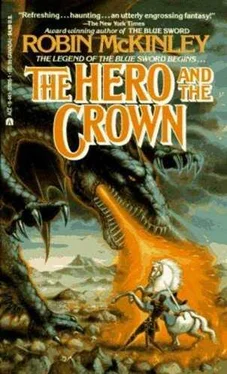Robin McKinley - The Hero And The Crown
Здесь есть возможность читать онлайн «Robin McKinley - The Hero And The Crown» весь текст электронной книги совершенно бесплатно (целиком полную версию без сокращений). В некоторых случаях можно слушать аудио, скачать через торрент в формате fb2 и присутствует краткое содержание. Год выпуска: 1984, Жанр: Фэнтези, на английском языке. Описание произведения, (предисловие) а так же отзывы посетителей доступны на портале библиотеки ЛибКат.
- Название:The Hero And The Crown
- Автор:
- Жанр:
- Год:1984
- ISBN:нет данных
- Рейтинг книги:4 / 5. Голосов: 1
-
Избранное:Добавить в избранное
- Отзывы:
-
Ваша оценка:
- 80
- 1
- 2
- 3
- 4
- 5
The Hero And The Crown: краткое содержание, описание и аннотация
Предлагаем к чтению аннотацию, описание, краткое содержание или предисловие (зависит от того, что написал сам автор книги «The Hero And The Crown»). Если вы не нашли необходимую информацию о книге — напишите в комментариях, мы постараемся отыскать её.
But it is Aerin who rediscovers the old recipe for dragonfire-proof kenet, and when the army is called away to the other side of the country, it is she who, alone but for Talat, rides out to confront Maur, the Black Dragon, the last of the Great Dragons, for centuries thought dead.
Mythopoeic Fantasy Award for Adult Literature (nominee)
Newbery Medal
The Hero And The Crown — читать онлайн бесплатно полную книгу (весь текст) целиком
Ниже представлен текст книги, разбитый по страницам. Система сохранения места последней прочитанной страницы, позволяет с удобством читать онлайн бесплатно книгу «The Hero And The Crown», без необходимости каждый раз заново искать на чём Вы остановились. Поставьте закладку, и сможете в любой момент перейти на страницу, на которой закончили чтение.
Интервал:
Закладка:
“I hope at least the Crown was a surprise,” said Aerin.
Tor laughed. “The Crown was a surprise.”
The lifting of Maur’s evil influence was as important a relief to the beleaguered City as the unexpected final victory in the war; but there was still much healing to be done, and little time for merrymaking. Arlbeth was buried with quiet state. Tor and Aerin stood together at the funeral, as they had been almost always together since Aerin had ridden across the battlefield to give Tor the Crown; as the two of them had never publicly been together before. But the people, now, seemed to accept it, and they simply gave Aerin the same quiet undemonstrative respect that the first sola had received since the battle; it was as if they did not even differentiate between the two.
Everyone still felt more than a little grey, and perhaps in the aftermath of the Northerners a witch woman’s daughter whom they had, after all, grown used to seeing for over twenty years past seemed a small thing to worry about; and she was, after all, their Arlbeth’s daughter too, and Arlbeth they sincerely mourned, and they read in her face that she mourned too. She stood at Tor’s side while Arlbeth’s final bonfire burned up wildly as the incense and spices were thrown on it, and the tears streamed down her face; and her tears did more good for her in her people’s eyes than the Crown did, for few of them really understood about the Crown. But she wept not only for Arlbeth, but for Tor and for herself, and for their fatal ignorance; the wound that had killed the king had not been so serious a one, had he had any strength left. Maur’s weight on the king of the country it oppressed had been the heaviest, and the king had been old.
When Tor was proclaimed king in the long Damarian ceremony of sovereignty officially bestowed, it was the first time in many generations that a Damarian king wore a crown, the Hero’s Crown, for it had been tradition that the kings went bare-headed in memory of that Crown that was the heart of Damar’s strength and unity, and had been lost. After the ceremony the Crown was placed carefully back in the treasure hall.
When Aerin and Tor had gone to look for it three days after they hurled Maur’s skull out of the City, they had found it lying on the low vast pedestal where the head had lain. They had looked at it, and at each other, and had left it there. It was a small, flat, dull-grey object, and there was no reason to leave it on a low platform, little more than knee high, and wide enough for several horses to stand on; but they did. And when the treasure keeper, a courtier with a very high opinion of his own artistic integrity, tried to open the subject of a more suitable keeping-place, Aerin protested before the words were all out of his mouth, although they had been directed at Tor.
Tor simply forbade that the Crown be moved, and that was the end of it; and the treasure keeper, offended, bowed low to each of them in turn, and left. He might not have wished to be quite so polite to the witchwoman’s daughter, for the courtiers were inclined to take a more stringent view of such things than the rest of Damar. But any lack of courtesy that survived the highborn Damarians’ knowledge that Aerin-sol had fought fiercely in the last battle against the Northerners (although of course since she’d shown up only on the last day she’d had more energy left to spend), and the inalterable fact that their new king was planning to marry her, tended to back down in the face of the baleful glare of her four-legged henchmen. Not that they ever did anything but glare. But the treasure keeper’s visit had been watched with interest by nine quite large hairy beasts disposed about Aerin’s feet and various corners of the audience chamber.
Chapter 25
TOR HAD WANTED to marry her as part of the celebration of his kingship, and have her acknowledged queen as he was acknowledged king, but Aerin insisted they wait.
“One might almost think you didn’t want to be queen,” Tor said glumly.
“One might almost be right,” replied Aerin. “But it’s more that I don’t want anybody to have the opportunity to say that I slipped in the back door. That I was assuming everyone would be so preoccupied with you that no one would notice I was being declared official queen by the way.”
“Mm,” said Tor.
“It was Arlbeth who told me that once royalty commits itself it can’t go back into hiding,” Aerin said.
Tor nodded his head slowly. “Very well. But I think you’re doing your people an injustice.”
“Ha,” said Aerin.
But Tor was right, although not for the reasons he would have preferred; it had little to do with her fighting in the last battle, and almost nothing to do with the Crown. By the time the three months’ betrothal that Aerin demanded was up and the marriage was performed, thirteen weeks after what had come mysteriously to be called Maur’s battle, most Damarians (all but a few hidebound courtiers) seemed to have more or less forgotten that they had ever held the last king’s daughter in so lively an antipathy; and affectionately they called her Fire-hair, and Dragon-Killer. They even seemed to enjoy the prospect of Aerin as their new queen; certainly the wedding was a livelier meeting than Tor’s crowning had been, and the crowd cheered when Tor declared Aerin his queen, which startled them both. But many things that had happened before the day Maur’s head had been dragged into the City had faded from people’s memory, and at the wedding they said comfortably to one another that it was true that the first sol’s mother had been a commoner from some outlandish village in the North, and that Aerin-sol had always been an odd sort of child; but she had grown into her rank quite satisfactorily, and she had certainly helped turn the Northern tide with that funny foreign sword of hers and those wild animals that were so fond of her (there are worse spells than those that make wild animals tame).
Besides, while Tor had remained obstinately single, all the other sols of his generation had gotten themselves married off; and Aerin was, whatever her faults, a first sol.
And when Aerin understood at last what had happened, she laughed. So Maur did me a good turn after all, she thought. That’s the finest victory of all.
It was called Maur’s battle perhaps because it had been fought on what was now known as Maur’s plain. While much else had been forgotten, or at least become a little blurry, of the events before the seasons the City had borne with Maur’s head held in the king’s castle like an enormous jewel, everyone well remembered that at the end of the battle the stretch of earth at the foot of the king’s way was a destroyed forest, and that bodies of people and beasts, and of half-beasts and half-people, lay everywhere, with broken bits of war gear mixed with the broken landscape. And they remembered Maur’s skull rushing down on them—flaming, they said, like a living dragon, its jaws open to spew fire—and spinning past them in the darkness.
And in the morning, when they awoke, instead of low rolling hills despoiled by war, they found a plain, flat as a table, stretching from the burnt-out fire where the survivors had slept huddled together to the feet of Vasth and Kar and the pass where Aerin had paused and seen what awaited her and gathered herself and her army together. It was a desert plain, and it remained a desert; nothing grew there, nor would grow, but a little low scrub. Desert creatures came to live there, and a new sort of hunting dog was bred to run by sight, and the City dwellers came to love the wild sweet song of the britti, the desert lark. They took to holding horse races on the plain after the first few years of staring at it nervously had worn off, and the uncanniness was lost in familiarity; and then various games of skill were pursued there, mock battles and sword-play, and it became a much better practice ground than the old cramped space behind the castle and the royal stables at the peak of the City. It was a handy spot for the drilling of cavalry, and Tor paid much attention to the rebuilding of his cavalry, for he, like his wife, if perhaps no one else in the City, remembered very clearly what had happened in the months preceding Maur’s battle. The Laprun trials therefore grew in size and importance, which was all to the good; what was less good was the growing popularity of the churakak, the duel of honor, fought by those a little too proud of their ability to fight.
Читать дальшеИнтервал:
Закладка:
Похожие книги на «The Hero And The Crown»
Представляем Вашему вниманию похожие книги на «The Hero And The Crown» списком для выбора. Мы отобрали схожую по названию и смыслу литературу в надежде предоставить читателям больше вариантов отыскать новые, интересные, ещё непрочитанные произведения.
Обсуждение, отзывы о книге «The Hero And The Crown» и просто собственные мнения читателей. Оставьте ваши комментарии, напишите, что Вы думаете о произведении, его смысле или главных героях. Укажите что конкретно понравилось, а что нет, и почему Вы так считаете.












